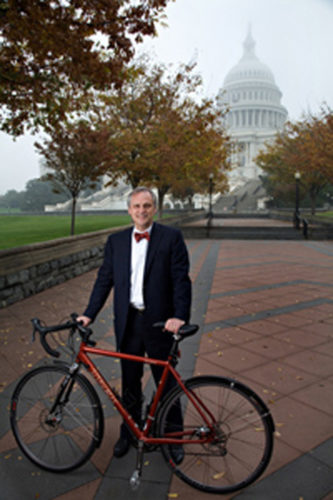Rep. Earl Blumenauer (D-OR) founded and co-chairs the Congressional Bicycle Caucus. An avid cyclist himself, he has perhaps championed bicycling more than anyone else in Congress. Since being elected, he has introduced or cosponsored more than 100 bills that would improve conditions for bicyclists. In this Congress, he introduced legislation to clarify that bikeshare programs can get federal funds, to restore and expand tax benefits for bicycle commuters, and to implement Vision Zero to end bike fatalities.

Blumenauer answered questions put to him in writing by Cycling West:
Cycling West: How many members does the Congressional Bicycle Caucus currently have?
Rep. Earl Blumenauer: The caucus has 108 members, more than a quarter of the House of Representatives.
CW: What activities are planned and have been recently conducted? What has CBC accomplished to promote bicycling across the country?
EB: The leadership of the Bike Caucus has introduced multiple pieces of legislation that would incentivize biking to work, encourage greater multimodal connectivity, and improve safety for vulnerable roads users. The caucus has also educated members and staff about federal bike programs through congressional briefings and kept congressional offices engaged and aware of recent developments in the cycling community.
I hope to work with caucus members to improve the surface transportation legislation in the Senate by further increasing Transportation Alternatives funding and seeking to better incorporate transit and cycling as well as the work cities are doing around Vision Zero and Safe Streets.
CW: How can the caucus work with cycling advocates to further the goals? What can cyclists and their associations do better? State and local advocacy groups focus on state & local issues, as they should, but should they also pay attention to how federal policy can affect their communities? Perhaps by staying more in touch with their delegations and commenting on federal polices, ranging from National Park Service and Forest Service plans to Metropolitan Planning Organization regulations, local groups can help effect national change.
EB: You can’t give up on the federal partnership. It is true that the federal government has been missing in action while local governments have been making immense strides toward improving connectivity and accessibility for active transportation. But with your help, the federal government can be far more impactful.
Every year, the federal government spends tens of billions of dollars on transportation improvements, yet only a small portion is provided for bike infrastructure. The cycling community needs to be at the table in far greater numbers, demanding that all road users are provided with federal transportation benefits. As the climate crisis grows more devastating, cyclists are an even more important part of the solution. Staying in touch with your congressional delegations, inviting members of Congress and their staffs on bike rides, and actively engaging with your lawmakers is critical.
CW: As you know, recently the tax break for cyclists was lost, it was probably underused when it was available. I know you want to restore the tax break in a way that will benefit more people, but were advocates too weak to defend it? How did we let it get away, and how did we allow cuts to Transportation Alternatives and related programs, such as the Safe Routes to School earmark, enabling funds to be transferred to other non-cycling programs?
EB: It is tempting to attribute these setbacks to a decline in federal engagement from the cycling community. To a certain extent, that is true. It is frustrating that advocacy has declined.
The tax bill is a different issue. It was hatched in secret and the provisions related to cycling and to commuter benefits were never subjected to a hearing. Indeed, the whole bill never had a hearing and was literally being rewritten while we were voting on it. The Republican tax bill negatively affected many different advocacy communities, which was part of their strategy to provide the largest transfer of wealth in American history.
Whether it is a bicycle commuter tax benefit, the Transportation Alternatives program, Safe Routes to Schools, or Vision Zero, it is critical that cyclists are at the table early and often. Certainly, every other mode of transportation comes to Washington to advocate for themselves; we need to be there as well.






